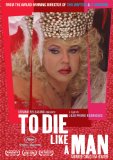| Reviews & Columns |
|
Reviews DVD TV on DVD Blu-ray 4K UHD International DVDs In Theaters Reviews by Studio Video Games Features Collector Series DVDs Easter Egg Database Interviews DVD Talk Radio Feature Articles Columns Anime Talk DVD Savant Horror DVDs The M.O.D. Squad Art House HD Talk Silent DVD
|
DVD Talk Forum |
|
|
| Resources |
|
DVD Price Search Customer Service #'s RCE Info Links |
|
Columns
|
|
|
To Die Like A Man
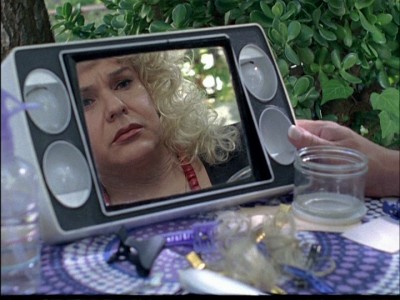
When it comes to narrative feature films with transsexual protagonists, humanization is often the overarching aim; see, for example, Duncan Tucker's Transamerica or Tod Williams's The Adventures of Sebastian Cole. In another strain of such films, the out-of-this-world fabulousness of such characters is showcased, e.g., Priscilla, Queen of the Desert and, with more subtlety and ambition, John Cameron Mitchell's Hedwig and the Angry Inch. I have no quibble with any of those films or their ability to convince us that transsexuals are people, too; but Portuguese writer/director João Pedro Rodrigues's To Die Like A Man (Morrer Como Um Homem) belongs to a different category--one including such disparate films as Almodovar's All About My Mother and Fassbinder's In a Year with 13 Moons--in which the foundational assumption is that no explanation needs to be given to the effect that a transsexual person is a person who, like any of us, is bound to experience conflict, reversals, joys, ups, and downs in unpredictable proportions on their journey through this messy life.
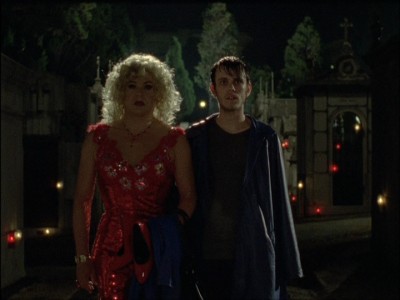
Tonia (the incredibly touching, convincing, and subtle Fernando Santos) is a middle-aged man, born as "Tonio," who has lived as a woman for the past 20 years but has never taken the final surgical step to femaleness. She squabbles with Jenny (Jenny Larrue), her young upstart rival at the drag cabaret they both perform in for a living, and grapples with the half-maternal role she must play in the self-destructive heroin addiction of her boyfriend, Rosário (Alexander David). Her friend Irene (Cindy Scrash), who has taken that last physical leap from manhood to womanhood, keeps hectoring Tonia to have the surgery, which she is still not certain she's ready for. The only thing in Tonia's life that gives her full, unconditional love is her dog, Agustine, to whom she is pragmatically but firmly devoted. A turning point of sorts comes when Tonia's estranged son, Zé Maria (Chandra Malatitch), gone AWOL from the army after committing a crime that stemmed from his unresolved feelings about his homosexuality, shows up for a violent, emotionally shattering confrontation that seems to add a new urgency to Tonia's need to set her chaotic, unfulfilled existence aright.
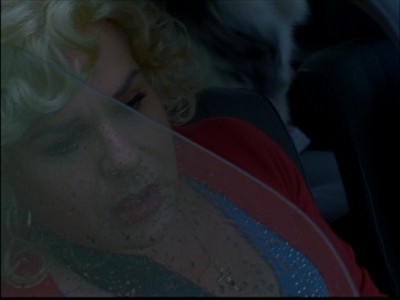
The film might seem to meander in the beginning, and the way in which jarring events unfold without explanation can leave us feeling a bit lost. We do not know at first who all the characters are, how they relate to one another, or why the film's emphases are placed where they are. But if you get lost, the film finds you; it has an oddly pleasing way of circling back towards reference points you thought it had abandoned. We do not realize the importance of the strange forest location and bizarre, isolated rural household of the film's opening scene until much later, for example; but it does recur, just when we least expect it and in an unusually meaningful way. Rodrigues has enough faith in us and our patience to allow his film to fit together with an unpredictable symmetry, answering itself unexpectedly, with off-kilter but exhilarating timing, like a poem.
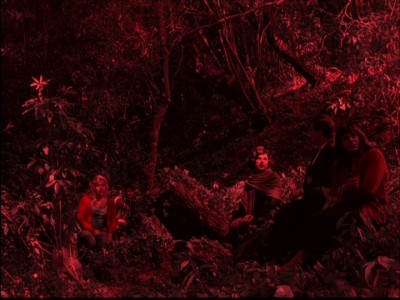
This makes for a structure and tone in To Die Like A Man that is most unique and, for the most part, realized with a fine aesthetic and technical assurance as well as a perfect emotional pitch; this film is doing too many interesting things and approaching its characters and their lives with too much real compassion and eyes too open to ever be merely sentimental or broadly "affirmative." Rodrigues, his cinematographer, Rui Poças, and his co-editor, Rui Mourão, create a heightened reality for the film that, while individual scenes play out more or less naturalistically, allows for some impressively sliding, free-associative transitions. It also provides a workable context for the several sequences that are pure surrealism, such as the 20-minute interlude in which Tonia and Rosário lose their way on a road trip and end up back in the forest with the strange villa from the film's opening. Everything ends up as unified as it needs to be, and the film's elements all work together surprisingly well, even the ones that seem dubious at first, thanks to Rodrigues's visionary control of the proceedings and his ability to draw us in with his calm, relaxed long-take pacing and intuitively elegant strategies for camera movement, framing, and composition. The film's climax--ironically but very appropriately the only time we see Tonia, apparently a renowned and well-loved performer, strut her stuff--is a tableau-like mini-masterpiece in itself. With an aching yet clear-eyed tenderness, it reiterates, encompasses, and closes gently upon all the film's characters and themes with a sweeping, tragic, well-earned and very well-achieved grandiosity.
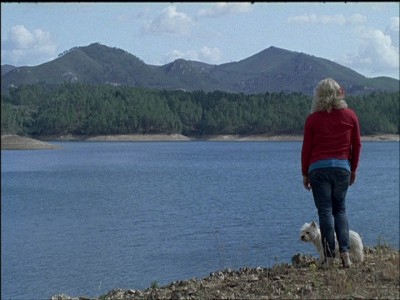
THE DVD:
Furthering its likeness to Fassbinder, the film is shot, like many of that great German fabulist's melodramatic takes on gritty reality, in the "old" 1.33:1 aspect ratio on warmer, brighter Kodak color film, and Strand Releasing has done a genuinely conscientious job with the transfer, conveying the film's colorful, vibrant, beautifully lit and processed look with all of its nuances and shimmering-celluloid texture intact.
Sound:The disc's Dolby Digital 2.0 soundtrack (in Portuguese with clearly legible, solidly translated English subtitles) delivers with unbroken clarity and vividness all of the subtle aural layering of the film's dialogue, the particularly well-recorded and utilized background sound of each scene (loud enough to create the feel that one is there in a real world with the characters, not so loud as to be distracting), and the film's rare but perfectly timed and integrated uses of music.
Extras:There are no extras other than the film's just-okay U.S. theatrical trailer and some previews for other Strand Releasing titles.
FINAL THOUGHTS:A film that works on associations of memory and feeling rather than logic, To Die Like A Man has, for all its fearless display of the messy details of the lives of marginalized people (depicted with genuine respect, never as exoticized or bizarre oddities), an almost spiritual quality to it. It tracks one soul's journey as it struggles to metamorphose away from earthly, biological limitations to what it really needs and wants to be--desires that themselves must be felt out and discovered along the way. That kind of metamorphosis may be more overtly apparent in the case of a transsexual character like Tonia than in most others, but what it represents in human nature--the need to grow, to progress, to evolve, to become our true selves, what we need to be as opposed to roles pre-designated by nature or culture--is basic and recognizable no matter who you are, which is a bit of wisdom that this humane, universally resonant film understands very well and lays out for us with a strange, captivating grace all its own. Highly Recommended.
|
| Popular Reviews |
| Sponsored Links |
|
|
| Sponsored Links |
|
|
| Release List | Reviews | Shop | Newsletter | Forum | DVD Giveaways | Blu-Ray | Advertise |
|
Copyright 2024 DVDTalk.com All Rights Reserved. Legal Info, Privacy Policy, Terms of Use,
Manage Preferences,
Your Privacy Choices | |||||||









